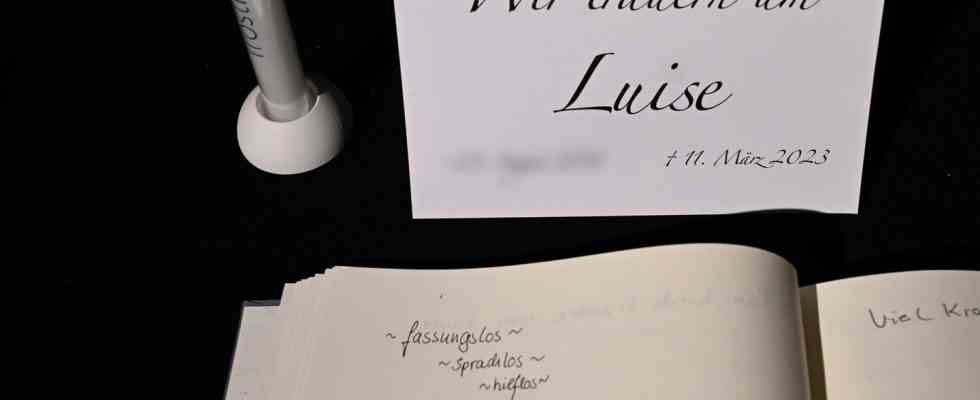Murder in Freudenberg
Justice at the limit: what happens when the perpetrators are too young to be punished?
Mourning for the 12-year-old who was killed: there is a book of condolences in the evangelical church in Freudenberg
© Roberto Pfeil / DPA
In Freudenberg, two children killed a 12-year-old with stab wounds. But the perpetrators are too young to be punished. NRW Prime Minister Wüst promises that Luise’s death will have consequences.
“Stunned – speechless – helpless”: Three words are written on one page in the book of condolences for the 12-year-old Luise who was killed in the Evangelical Church in Freudenberg. They express well what many people in the small town near Siegen in North Rhine-Westphalia are feeling right now. Since the weekend, people have been mourning the 12-year-old schoolgirl who was killed on the way home in a forest after visiting a friend. The news came on Tuesday: The suspected perpetrators are still children themselves. Two 12- and 13-year-old girls confessed to having stabbed Luise numerous times. The children knew each other.
When you talk to people in downtown Freudenberg, you always come up against one question: Why? Why did the student have to die? And why do you think two children committed such a cruel act?
The investigative authorities are very reluctant to answer these questions. The alleged perpetrators must be protected – precisely because they are still children themselves, emphasized the chief public prosecutor in Koblenz, Mario Mannweiler.
He says only this much: “What might be a motive for a child to commit an act might not be apparent to an adult.” In any case, in view of the many stab wounds suffered by the victim, it is reasonable to assume “that some emotions played a role.”
Acts of violence among children are rare – but have increased
Luise’s death will have no criminal consequences. Children under the age of 14 are generally innocent – even in the case of a crime as serious as murder or manslaughter. Because it is assumed that they do not yet have a sufficient overview of the consequences of their actions.
At the end of the investigation, the public prosecutor’s office passes the case on to the youth authorities. According to experts, the measures taken there depend heavily on the individual case. It is conceivable that a child will receive psychiatric treatment, possibly in a closed facility. It is also possible that the parents will receive help with the upbringing – or that the child will be placed in a home or with a foster family for a while. However, the legal hurdles for separating from the parents against their will are high.
It is rare for children under the age of 14 to commit violent crimes such as serious physical injury, sexual abuse, manslaughter or murder. In 2021, the number of suspected children in this area increased nationwide compared to the previous year (7477 to 7103). Compared to 2019, however, there was a decrease of around ten percent in 2021.
The absolute numbers for crimes against life are extremely low: in 2021 there were 19 suspected children in this area nationwide, including four girls. The numbers vary greatly from year to year, in the past 20 years they have been between four and 21 suspects per year. For classification: According to the Federal Statistical Office, around 8.5 million children under the age of 14 lived in Germany this year.
“Case in the hands of the juvenile authorities”
NRW Prime Minister Hendrik Wüst (CDU) spoke of a worrying increase in North Rhine-Westphalia. “We not only have to monitor this development closely, we have to investigate it, find causes and do preventive work,” he emphasized. “Freudenberg’s act will leave traces beyond Luise’s terrible death.” What this act triggers in the local and school community can at best be guessed at, said Wüst.
Police were at the scene again on Tuesday. There was still no trace of the murder weapon. The place where Luise’s body was found and where she was probably killed is a secluded place in the forest on the border between Rhineland-Palatinate and North Rhine-Westphalia. Freudenberg is a few kilometers away. Cell phones have no reception here. The terrain is impassable, only one bike path leads through the valley. Actually, Luise shouldn’t have gone here to come home. The investigators say nothing about what brought the three girls here.
“We are now placing this case in the hands of the youth authorities,” said prosecutor Mannweiler. Psychologists, psychiatrists and parents are now in demand. “The real work is only just beginning.”

